Conclave
 for thematic material and smoking.
for thematic material and smoking.
Reviewed by: Jim O'Neill
CONTRIBUTOR
| Moral Rating: | Average |
| Moviemaking Quality: |
|
| Primary Audience: | Adults |
| Genre: | Political-Thriller |
| Length: | 2 hr. 0 min. |
| Year of Release: | 2024 |
| USA Release: |
August 30, 2024 (festival) October 24, 2024 (wide release) DVD: December 17, 2024 |
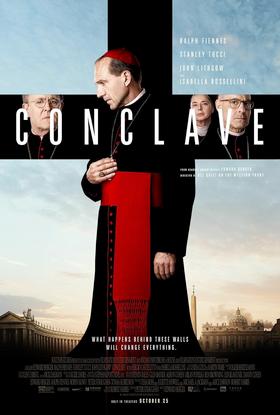

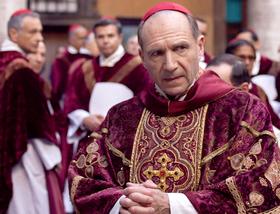
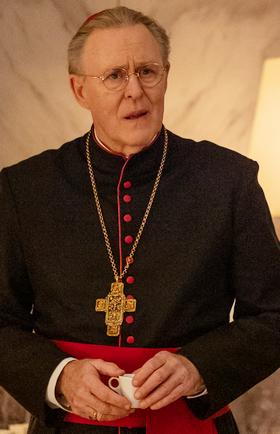
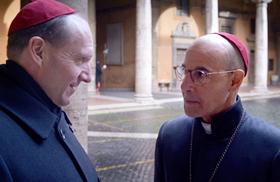
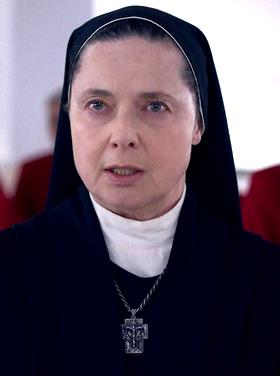
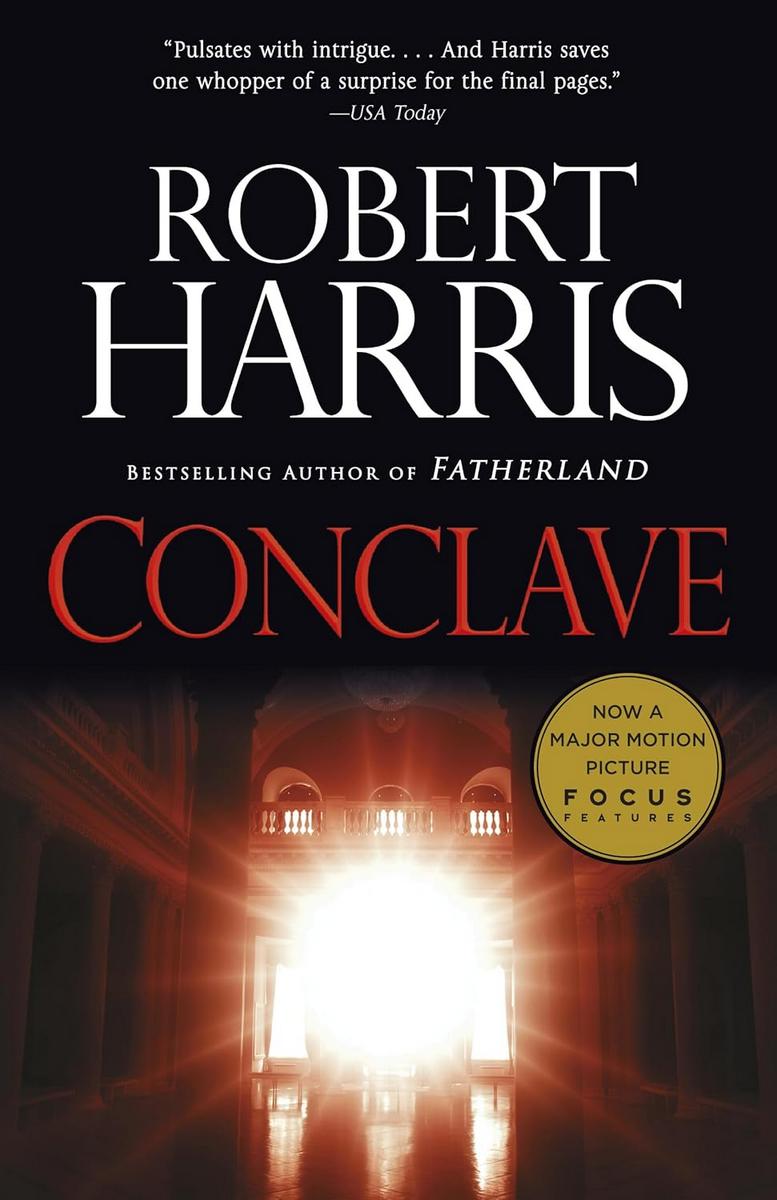
Film based on the Robert Harris novel Conclave (2016)
Unexpected death of a Roman Catholic Pope
“Holy” men succumb to temptations as a gripping election unfolds within the Vatican’s secretive halls
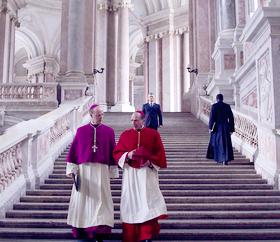
Secretive process of selecting a new Pope using Catholicism’s most powerful leaders gathered from around the world and locked together in the Vatican halls
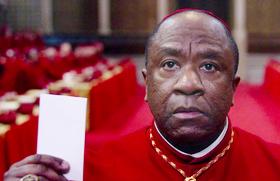
Cardinals contending to be chosen as the new Pope
Cardinals who are more like politicians than clerics—different parties and factions all trying to outdo each other, battling for themselves rather than for the greater good
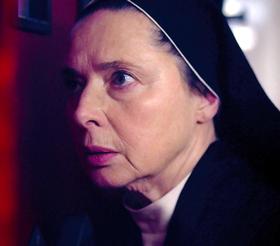
Conspiracy with deep secrets
Competing political agendas
Spiritual pollution that power can bring with it / ambition / seeking personal glory / corruption
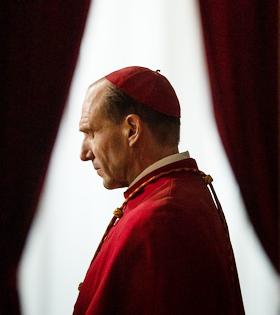
Emotional and spiritual confusion
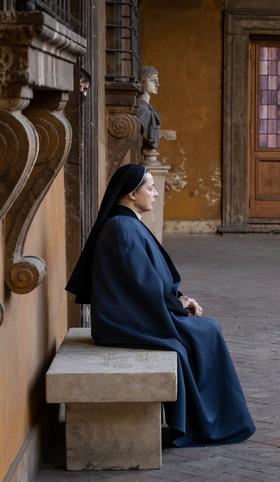
An open letter to Roman Catholics
What issues often separate Roman Catholics from God?
Is sola Scriptura a biblical or a man-made concept? (Traditions vs. Scripture alone)
Is the Bible truly the final authority in all matters of faith and morals?
What did the Early Church believe about sola Scriptura?
Personal testimonies of former devout Roman Catholics…
Former priest, Richard Bennett
Former altar boy, Stan Weber (“Falling In Love with the Biblical Jesus”)
QUIZ—Catholicism and Protestantism.
Do you think like a Protestant or a Catholic?
| Featuring |
|---|
|
Ralph Fiennes … Cardinal Lawrence Stanley Tucci … Cardinal Bellini of the Vatican John Lithgow … Cardinal Tremblay of Montreal Isabella Rossellini … Sister Agnes Lucian Msamati … Cardinal Adeyemi of Nigeria Sergio Castellitto … Cardinal Tedesco of Venice Carlos Diehz … Cardinal Benitez of Kabul, a intersex man (having biological variations in sex traits and/or reproductive anatomy) See all » |
| Director |
|
Edward Berger |
| Producer |
|
Tessa Ross Access Entertainment [Great Britain] FilmNation Entertainment See all » |
| Distributor |
“We do speak a message of wisdom among the mature, but not the wisdom of this age or the rulers of this age, who are coming to nothing. No, we declare God’s wisdom, a mystery that has been hidden and that God destined for our glory before time began. None of the rulers of this age understood it…” —1 Corinthians 2
“Our citizenship is in heaven.” —Philippians 3:20
“On such a full sea we are now afloat,
And we must take the current when it serves,
Or lose our ventures. —Shakespeare, “Julius Caesar, Act IV, Scene 2
Austrian director, Edward Berger has adapted “Conclave,” Robert Harris’ 2016 novel (Peter Staughan wrote the screenplay) and made it into a film so lugubrious and tendentious that it feels like flipping through the pages of a too-heavy-to-lift coffee table book, one with a self-improvement caption below every prissily posed glossy. The drama has some taut and edgy moments when it highlights the personal conflicts and political scandals that are the meat of such behind-the scenes dissections, but the climax Berger sets us up for is as pompous as it is preposterous.
In Vatican City the Pope dies unexpectedly and the College of Cardinals convenes to elect his successor. More than a billion Catholics throughout the world await its decision. The conclave takes place in secret so that outsiders cannot listen in or report on the discussions, disagreements, and compromises that the Cardinals engage in behind the locked doors of the Papal Palace.
Having no authentic source material about such elections, or about the men who vote in them, Harris, and now Berger, have eschewed putting together a documentary-style version of events. Instead, they have concocted their own preachy sermon, one that is not about how things happen, but about how they would want them to happen.
It is difficult to give an adequate synopsis of the film without revealing its explosive ending. By now, I would anticipate that many readers have either learned or guessed what’s inside that grenade. Having read Harris’ sometimes well-paced but often clumsily plotted tome I knew what to brace myself for, but I thought Berger might tone the ending down or add a touch of irony to what, in essence, comes down to a battle between the City of God and the city of men. The director concludes the story without a trace of foreboding, irony, or a sense that forming a friendship with the world might put us, as the Apostle James would say, in enmity with God. If there is any trade-off to bowing the head to what Berger believes is a progressive, and inevitable, good, he leaves the consequence of such progress unexamined.
Earlier this year I saw an Italian film, “Kidnapped,” directed by Marco Bellocchio about a Jewish boy who is abducted by the Vatican in 1857, a heated period in Italian history during which Pope Pius IX ruled the Papal states. The boy had been baptized secretly by a family nursemaid, so the Church took him from his family and raised him as a Catholic in a seminary school. I expected this to be a standard good versus evil story (Steven Spielberg planned a film version of the story but later scrapped it), but I was wrong. Bellocchio, not a poser in the mold of Berger or Spielberg, focused less on the political and legal aspects of what we would today label a crime and more on the personal and spiritual struggles that all individuals, guilty or innocent, face. The 84 year old Italian master offered no simple answers, only profound questions, and made one of last year’s best films.
Ralph Fiennes plays Cardinal Lawrence, appointed to officiate the conclave, as a too pensive, too introspective leader who is so wrapped up in his own internal struggles that one wonders not only how he reached such a leadership position in the College, but how he ever rose to the rank of Cardinal. Fiennes does agony of the silent, pressure-cooker type better than any other actor, but without a release valve, Fiennes can’t take us anywhere except deep inside his own tortured psyche. We’re not goaded to fight alongside him or cheer him on, but to stew with him in an over-seasoned but flavorless broth.
Cardinal Lawrence calls “certainty” a sin, one that sits above all others, a deadly enemy of “tolerance.” One might ask His Eminence, if not for certainty in matters of faith and theology, then what exactly is a College of Cardinals or a Pope for? He gives a sermon to the other Cardinals in which he professes that “without doubt and without sin, there can be no forgiveness,” and therefore, no understanding, no diversity and no tolerance. His talk may be poll-tested and boilerplate, but it is hardly traditional, and not at all scriptural. He could read from a Judith Butler or Michel Foucault text and make just as much sense. “Grant me a Pope who has doubts,” he prays, but never acknowledges a sense of responsibility to the crowds standing in St. Peter’s Square waiting for an answer. I wonder, if in times of crisis, if they too are looking for a leader “with doubts.”
The other Cardinals square off against each other; their exchanges at times being impactful, but rarely illustrative. They form an ensemble of types rather than men, a more refined, and better dressed, version of Sidney Lumet’s “12 Angry Men” jury pool.
Stanley Tucci plays Cardinal Bellini, a liberal who harbors fears of a conservative ascending to the Pope’s chair and reversing the changes made by the previous Pontiff; Sergio Castellitto is Cardinal Tedesco, a traditionalist who longs to see the Catholic Church return to its Latin Mass traditions; and John Lithgow is Cardinal Tremblay who mostly simpers while he massages all factions as assiduously as he does his own ego and ambition.
Rounding out the ensemble is Cardinal Benitez (Carlos Diehz), a Mexican who is now the Archbishop of Kabul. The young unknown Cardinal is an understated figure, shadowy and shapeless, but the key to a mystery that hangs over the proceedings. I have questions about how much of a Catholic presence, let alone a Catholic congregation with a Cathedral housing a Cardinal, could exist in Afghanistan’s capital. That part of the world is tragically becoming not more Christian, but much less so, due to persistent persecutions in the region. The film addresses Islamophobia as another modern Western evil, but no mention is made of the fact that today in Rome, the Pope’s city, more mosques are being built than are churches.
I cannot fault the film’s accoutrements: its set and costume design, its cinematography and its score are all stunners. Every shot is a pictorial composition, the lushest I’ve seen since 1953’s “The Robe.” If something of note happened within those frames the film could have generated, or at least forged, a personality and a soul, but every micro-drama peters out soon after its fire is lit.
Most of the action takes place beneath the ceiling of the Sistine Chapel and yet no reference is made to the majesty or the solemnity of walking and talking beneath one of the greatest accomplishments of Western Civilization. The only glimpses we get of Michelangelo’s work are of “The Last Judgment” scenes of the damned being cast into hell. The movie is less imbued with the spirit of the painting’s subject or even its artist than with the work’s patron, Pope Julius II, an effective leader but not exactly a holy man who ruled from 1503-1513.
Julius, naming himself not after an earlier Pope but after Julius Caesar, waged war against his enemies to maintain the Papal States, fathered an illegitimate daughter and made Cardinals of several of his Della Rovere relatives who were not ordained priests.
When assembling his ooh-aah compositions, Berger is not averse to a bit of copying. I suspect he is a fan of Alfred Hitchcock’s “Foreign Correspondent,” (so am I) since he re-creates the umbrella scene from that film but with more art and a lot less matter. I recall him pinching another of that film’s images, the “big dog as Nazi companion” in his previous film, “All’s Quiet on the Western Front” but that steal had more impact, and some humor.
The moving canopy of umbrellas, a multitude of “lights under bushels,” a subtle attempt to reveal a divide what is on earth from what is in heaven, disturbed me as did the array of red cassocks symbolizing not the passionate fervor of faith, and the willingness of the men wearing them to offer themselves as martyrs for Christ, but a blood sport worthy of the Colosseum.
This is not a film about questioning religious traditions, but one about sweeping them aside. And yet, its historical naivete is evident throughout. The film’s ending is not historically quite as implausible as it would have us believe, and I apologize if my comments spoil the movie’s suspense. I mentioned that Julius II made Cardinals of his own family members who were not ordained to the priesthood. Who would have stopped him if one of those relatives was a woman? That woman, by virtue of her being named a Cardinal, would conceivably be a candidate for the Papacy. Unlikely, but not impossible.
Berger never brings that up, something that might have enlivened this weepy, catfight of a conclave story. He has another agenda, one that, unlike Cardinal Benitez, is not ambiguous. They betray their motto about certainty being today’s enemy by sewing up their suppositions with pharisaical, and banal certitude. They let the mask fall when they let themselves aver that some certainties are more valid than other certainties.
Accusations about several of the candidates for pope are made throughout and each of those charges is met by Cardinal Lawrence with skepticism and circumspection. He fulfills his duties with assiduous examination and verification of each charge. The answers to those dilemmas are provided with one “deus ex machina” plot turn after another, the most unexpected and absurd turn of events being a bomb explosion whose shrapnel bursts through a glass window of the Sistine Chapel. The scene reminded me of many of the old “Star Trek” TV episodes in which there would be a crisis on board the Enterprise, followed by a galactic episode outside the ship, followed by everyone inside getting tossed about, and then presto, the craft rights itself. “We're up and running again,” “What’s next?”
That easy fix is one I liked 50 years ago. Not so much now. All the Cardinals’ fortunes change after the bomb goes boom, and their secrets, one by one, are exposed. However, when Cardinal Benitez reveals his own heretofore hidden past, Lawrence is strangely understanding and unquestioning. The medical reasoning for the mysterious Cardinal’s covert background and the Vatican’s acceptance of it are ludicrous. Benitez’ own vague personal story and circuitous reasoning are even bigger whoppers. What he tells Lawrence, and us, about his physiognomy in no way jives with his physical appearance. The filmmakers may want to open the doors to an institution that they believe keeps itself hidden from its flock, but they do an artistic injustice by putting blinders on the eyes of their viewers.
The spirit of the world was infected by the forces of darkness from its earliest days, as we know from Chapter 3 of Genesis. Corruption came into the world then, festers today, and often thrives in the halls of power. Only the Spirit of Christ can redeem that fallen nature. Berger’s film tells us that we can redeem ourselves by other means, by accepting the spirit of our age, and by getting with its program. But that spirit is a dark one, and “Conclave” despite all its color, style and au courant elan, is a dark film, weighted down by modernist guilt and a refusal to lift the spirit. It never soars because it never takes flight.
- Wokeism: Heavy
- Vulgar/Crude language: Minor
- Violence: Minor
- Drugs/Alcohol: Minor
- Profane language: None
- Nudity: None
- Sex: None
- Occult: None
See list of Relevant Issues—questions-and-answers.


PLEASE share your observations and insights to be posted here.
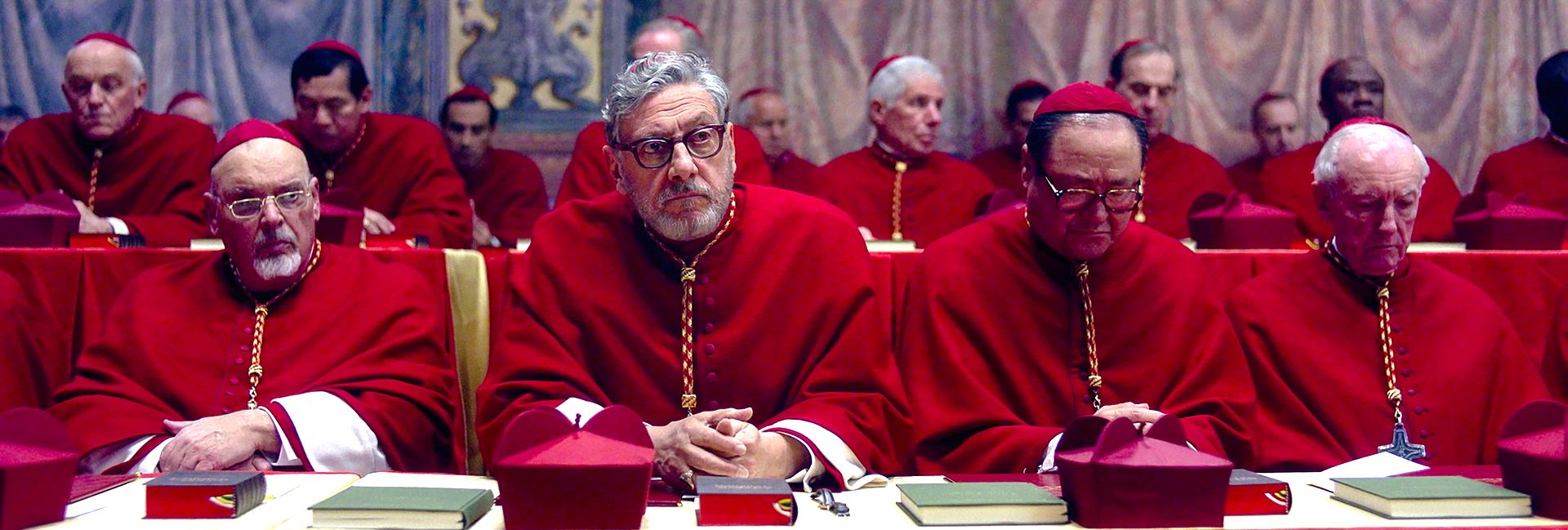

My Ratings: Moral rating: Offensive / Moviemaking quality: 5